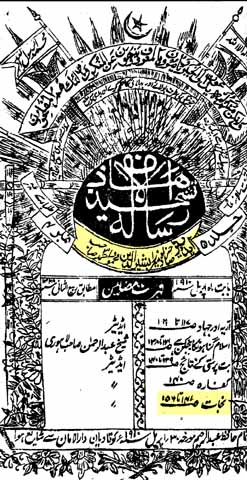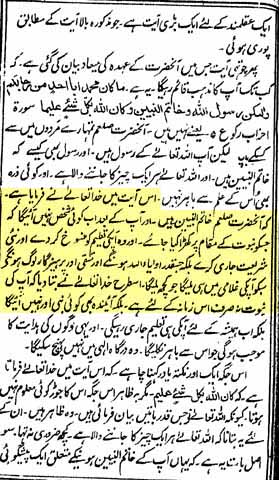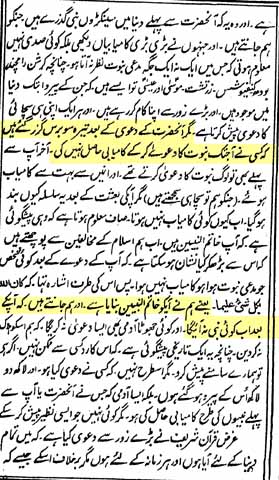Mirza Mahmud Ahmad wrote
in 1910 that Prophet Muhammad was the Last Prophet
The Khalifa of the Qadiani group, Mirza Bashir-ud-Din Mahmud Ahmad
(their leader from 1914 to 1965), who originated their belief that
prophets can come after the Holy Prophet Muhammad, himself had earlier
expressed the correct belief that no prophet can come after the
Holy Prophet Muhammad because he was the Khatam-un-nabiyyin.
In 1910, two years after the death of’ Hazrat Mirza Ghulam
Ahmad, Mirza Mahmud Ahmad wrote an article entitled Najaat
(Salvation) which was published in the monthly Tashhiz-ul-Azhan,
the magazine which he himself owned and edited. Shown below is the
front cover of that issue (April 1910, vol. v, no. 4) in which this
article appeared:

(In the image above, we have highlighted
the name of the editor, Mirza Bashir-ud-Din Mahmud Ahmad, and the
title of the article in question.)
In this article, he explains the meaning of the Khatam-un-nabiyyin
verse of the Holy Quran (33:40) as follows:
“In this verse God has said that the Holy Prophet
Muhammad is the Khatam-un-nabiyyin, and none shall come
after him who may be raised to the status of prophethood,
and who may abrogate his teachings and establish a new law. Nay,
however many saints (auliya) there are, and righteous
and pious persons, they will get all that they get through service
to him. Thus God has said that the Holy Prophet’s prophethood
was meant not only for his times, but that in future too no
prophet would come. …
Another point must be remembered here, namely, that in this
verse God says: ‘God is ever Knower of all things’.
This does not appear to have an obvious connection here because
it was not necessary to say, regarding the things God has explained,
that He is the Knower of everything. The fact is that the Holy
Prophet’s being the Khatam-un-nabiyyin contains a
prophecy. This is that before the Holy Prophet Muhammad there
arose hundreds of prophets in the world that we know about and
who had great success. In fact, there does not appear to be any
century in which, at one place or another, no claimant to prophethood
could be found. So Krishna, Ramachandra, Buddha, Confucius, Zoroaster,
Moses and Jesus are those whose followers still exist in the world,
and are forcefully doing their work, each group putting forward
the claim of its truth. But thirteen hundred years have passed
since the Holy Prophet’s claim, and no one who claimed prophethood
has ever attained success. After all, prior to his time people
used to claim prophethood, and many of them were successful, whom
we believe to be true. But why has this arrangement stopped with
his advent? Why is no one successful now? Obviously because of
the prophecy that he is the Khatam-un-nabiyyin. Now we
ask the opponents of Islam, what greater sign can there be than
the fact that, after the Holy Prophet, no person who claimed
prophethood was successful. It is this which is referred to
in the words: ‘God is ever Knower of all things’. That
is to say, We have made him Khatam-un-nabiyyin and We know
that no prophet would come after him, and any liar making such
a claim would be destroyed. This, therefore, is a historical
prophecy which no one can possibly refute.”
(Pages 151–152; underlining above is ours)
It is clearly stated in this article that:
- “… none shall come after him [Prophet Muhammad] who
may be raised to the status of prophethood”
- Those who come after him among the Muslims are the auliya
or saints.
- “the Holy Prophet’s prophethood was meant not only
for his times, but that in future too no prophet would come”
- “…what greater sign can there be than the fact that,
after the Holy Prophet, no person who claimed prophethood was
successful…”
- God says in the Quran that “We know that no prophet would
come after him, and any liar making such a claim would be destroyed”.
This proves conclusively that the Qadiani belief that prophets
can come after the Holy Prophet Muhammad and that Hazrat Mirza Ghulam
Ahmad was a prophet, was a later development, much after the death
of Hazrat Mirza Ghulam Ahmad who died in May 1908. Therefore Hazrat
Mirza could never have taught these beliefs, and indeed what he
taught was exactly what Mirza Mahmud Ahmad has written in the above
article.
Image of original Urdu article
Shown below are the images of the complete pages 151 and 152 from
the original magazine Tashhiz-ul-Azhan, on which the above
extract occurs. We have highlighted some text in yellow.


|


